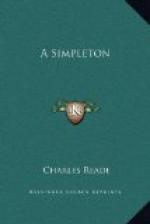This bright variegated picture of holy wedlock, and its essential features, as revealed to young ladies by feminine tradition, though not enumerated in the Book of Common Prayer writ by grim males, so entranced her, that time flew by unheeded, and Christopher Staines came back from her father. His step was heavy; he looked pale, and deeply distressed; then stood like a statue, and did not come close to her, but cast a piteous look, and gasped out one word, that seemed almost to choke him,—“Refused!”
Miss Lusignan rose from her chair, and looked almost wildly at him with her great eyes. “Refused?” said she, faintly.
“Yes,” said he, sadly. “Your father is a man of business; and he took a mere business view of our love: he asked me directly what provision I could make for his daughter and her children. Well, I told him I had three thousand pounds in the Funds, and a good profession; and then I said I had youth, health, and love, boundless love, the love that can do, or suffer, the love that can conquer the world.”
“Dear Christopher! And what could he say to all that?”
“He ignored it entirely. There! I’ll give you his very words. He said, ’In that case, Dr. Staines, the simple question is, what does your profession bring you in per annum?’”
“Oh! There! I always hated arithmetic, and now I abominate it.”
“Then I was obliged to confess I had scarcely received a hundred pounds in fees this year; but I told him the reason; this is such a small district, and all the ground occupied. London, I said, was my sphere.”
“And so it is,” said Rosa, eagerly; for this jumped with her own little designs. “Genius is wasted in the country. Besides, whenever anybody worth curing is ill down here, they always send to London for a doctor.”
“I told him so, dearest,” said the lover. “But he answered me directly, then I must set up in London, and as soon as my books showed an income to keep a wife, and servants, and children, and insure my life for five thousand pounds”—




